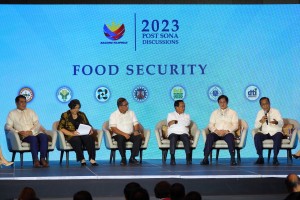QUEZON CITY, (PIA)-- The Department of the Interior and Local Government (DILG) will continue to implement policies and programs supporting the ‘Kadiwa ng Pangulo’ to make food accessible and affordable to all Filipinos. This initiative is in support of President Ferdinand R. Marcos, Jr.’s goal of ensuring food security in the country.
In a post-State of the Nation Address (SONA) forum on Tuesday, the DILG said it will continue to intensify engagements between national and local governments to put up regular Kadiwa Centers in different localities to reach more people.
"The Kadiwa program is an important measure that quickly responds to food insecurity and is also a useful measure to introduce high-nutrient foods to malnourished populations,” Local Government (DILG) Undersecretary Odilon Pasaraba said.
“The DILG, in partnership with the local government units (LGUs) and concerned national government agencies (NGAs), aims to bring this initiative down to our communities so we will be able to reach more Filipinos, especially the poor,” Usec. Pasaraba added.
He also urged all local chief executives to establish Kadiwa stalls in their barangays and seek the cooperation of civil society organizations and the private sector to employ a “whole-of-nation” approach to ensuring food security.
The Kadiwa Program is a farm-to-consumer market chain program that eliminates intermediaries, allowing local producers to sell directly to consumers at affordable prices.
Hapag sa Barangay Project
Further, the DILG reported that its Halina’t Magtanim ng Prutas at Gulay (HAPAG) sa Barangay Project has so far allocated over 881 hectares of land for community gardening in 19,188 barangays nationwide.
Launched early this year, the HAPAG sa Barangay Project encourages barangays and households to produce fresh, healthy, and affordable fruits and vegetables from their backyards and spaces through the establishment of community gardens in vacant and unused areas of their respective barangays.
“The DILG will remain a staunch supporter of the overarching goals of the Marcos administration in building an inclusive society where no one is hungry and where Filipinos live long and healthy lives,” Usec. Pasaraba said.

In relation to the DILG’s directive, Caloocan City Mayor Dale Gonzalo “Along” Malapitan led the inauguration of the Kadiwa Bagsakan Center (KBC) in Phase 9, Barangay 176, Bagong Silang on Tuesday, July 25.
The KBC in Bagong Silang is the first local government-initiated center to be established in Metro Manila, to alleviate nutrition problems in low-income areas by providing residents with a permanent local market with cheap and locally-sourced goods.
It also features a spacious area with more than 200 stalls for dry goods, wet market, and general merchandise.
The mayor assured consumers that the goods being sold at the KBC are guaranteed to be safe, clean, and of good quality.
Malapitan also said the lease for the vendors' stalls at the KBC will be free for the first six months.
The local chief executive said the KBC is in line with President Marcos’ of ensuring availability of affordable and nutritious food for every Filipino. (pia-ncr)



